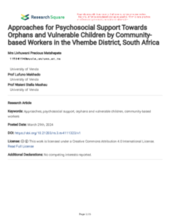Introduction:
The Orphans and Vulnerable Children's (OVC) crisis has raised the need for alternative solutions to OVC's problems. These new alternatives gave prominence to the growth of community-based organizations (CBOs) and their interventions. Community-based interventions are a crucial component of the response to make sure components of the response to ensure that the demands of OVCs are mitigated as they offer initial support and act as well-being nets.
Methods:
A qualitative exploratory-descriptive design was used to explore possible approaches to psychosocial support for OVC from community workers. This study was conducted in four municipalities of Vhembe district: Thulamela, Makhado, Collins Chabane and Musina. The population consisted of community workers working with AIDS-vulnerable and orphaned children in the Vhembe district. Data were collected in focus group discussions with community staff using a focus group discussion guide with open-ended questions. The data were analysed according to Tesch’s open data analysis guide to analyse qualitative data. The measures to ensure trustworthiness included transferability, conformability, credibility, and dependability.
Results:
Analysis data generated the following theme and subthemes: Psychosocial interventions provided Physical support, educational support, psycho-educational support, activities and socialisation, caregivers support and involvement and inter-professional referral.
Conclusion:
Community-based organisations are providing psychosocial support interventions to OVC. Conversely, the study also revealed that community-based organisations are experiencing challenges when delivering those services to OVC.

